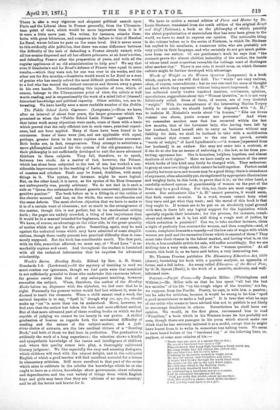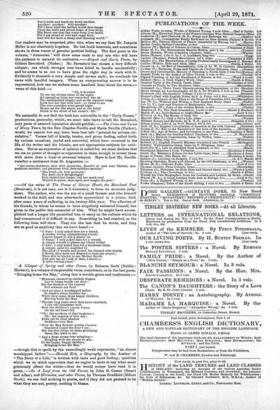POETRY.—Pacflic Poems.—By Joaquin Miller. (Whittingham and Wilkins.)—Mr. Miller tells us
that he has spent "all but the last few months" of his life "on the rough edges of the frontier," not far, we suppose, from the Pacific. Poetry, he says, is with him a passion ; but he asks for criticism, because it would be wrong to let him "spoil a good mountaineer to make a bad poet." It is true that what he says of one critic who seems to have advised him not to publish is not likely to encourage frankness in others. Nevertheless he shall have our opinion. We would, in the first place, recommend him to read
" Firmilian," a book which in his Western home he has probably not seen, though there are passages in his poem which almost make one think that he has seriously imitated it as a model, except that he might
have learnt from it to write in somewhat less halting verse. Wo seem to have heard before of the " barehead boy" of the following lines, or, anyhow, of some near relative of his :— " There was one once of a nature like to this ; He Mood a barehead boy upon a cliff Pine-crowned, that hung high beetling a bleak north sea,
His long bright hair did stream like yellow silk, Iii, sea-blue eyes did lie twin lakes O'erhung by mountain arched in virgin snow. He was far astray, and friendless and alone, A tropic bird blown through the north frost wind. He stood o er the sea in the cold white night, His thin face lifted to the flashing stars,
And did talk familiarly face to face, As confronting a merchant across a counter,
And in vehement blasphemy did say,
• God, put aside this world—show me another: God, this world's a chest—hand down another! 1 will nut buy—not have it as a gift.
Put it aside and hand me down another. Another! another! Still another!
Till I have tried the fairiest world that bangs Upon the walls and proud dome of your shop, The finest one that has come from your hand, For I am proud of soul and regal born, And will not have a cheap and cheating world."
Our readers may be surprised, after this, when we say that Mr. Joaquin Miller is not absolutely hopeless. He has lucid intervals, and sometimes shows in them traces of genuine poetical feeling. The first piece in the volume, " Arazonian " will show some such to any one who will have the patience to unravel its confusion. —Rival: and Early Poems, by Gilbert Beresford. (Nisbet.) Mr. Beresford has chosen a very difficult subject; one which stronger men have failed to handle successfully; and he seems to us not to have gone the right way to work with it. Evidently it demands a very simple and severe style; he overloads his verse with fanciful imagery. When an overpowering sorrow is to be represented, how can we endure 80121e hundred lines about the moon,—
• verse of this kind :—
"Oh, it is sweet To see the silvery sister of the night, All spangling from her ocean-bed, rise up The unmeasured height, and at the topmost verge Lock feet her lips with hers ; or sweet to see The ever-constant even-paced night Mount up the dim abyss, and at the brink
Drink in the silver of her sister's • life.'"
We naturally do not find the faultless noticeable in the "Early Poems," productions, generally, which, we must take leave to tell Mr. Beresford, only poets of assured reputation should publish.—The Cross and Verses of Many Years, by the Rev. Charles Neville and Maria Neville (Parker), would, we cannot but say, have been best left "printed for private cir- culation." Verses full of kindly, tender, and pious feeling, called forth by various occasions, joyful and sorrowful, which have occurred in the life of the writer and his friends, are not appropriate subjects for criti- cism. But as an expression of opinion is called for, we must declare that we see no power of thought or expression in them enough to invest them with more than a local or personal interest. Here is how Mr. Neville versifies a sentiment from St. Augustine :—
"Qui antem desiderat, sicut dicit Apostolus, dissolvi et ease Cum Christo, non patienter moritur ; sed patienter vivit, delectabiliter moritur."
"She lived—oh, how patiently! She died—how delightingly!
Pain racked her frame! but her meek soul Waited in peace, then sped, and sought the goal."
—Of the value of The Poems of George Heath, the Moorland Poet (Bemrose), it is not easy, nor is it necessary, to form an accurate judg- ment. The author, who was the son of a small farmer, and who himself worked in the field, and was afterwards apprenticed to a joiner, died, after some years of suffering, in his twenty-fifth year. The affection of his friends, to whom he seems to have singularly endeared himself, has given to the public this memorial of him. What he might have accom- plished had, a longer life permitted him to carry on the culture which he had commenced it is difficult to say. Something he had reached, as the following lines will show. They are the last that he wrote, and they are as good as anything that we have found :—
" 0 Fate! I only asked thee for a friend,
A tender, loving, sympathizing friend; I never hoped to win a dearer tie.
0 Fame! I only asked thee for a wreath, A simple wreath to please my friend withal.
0 Life: I only asked thee for a moderate lease, A simple, quiet lot, ungilded by The glow of wealth and power, but blessed with health.
0 Earth, they have not deigned to hear my prayer; Thou wilt be kinder to me, Mother Earth, And give me all I ask of thee, I know,— A quiet resting-place."



































 Previous page
Previous page